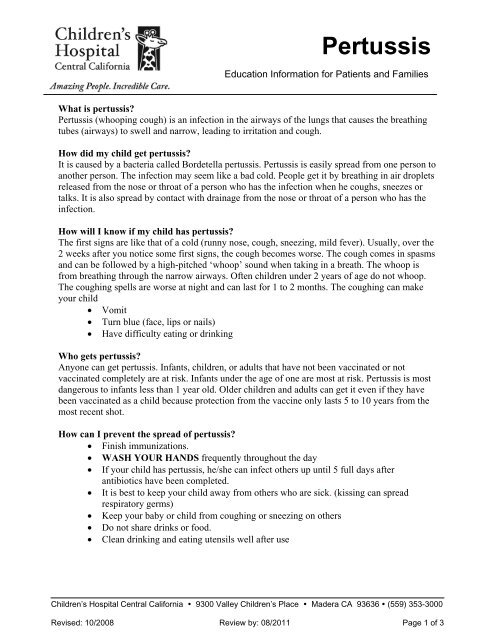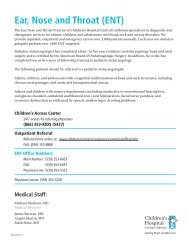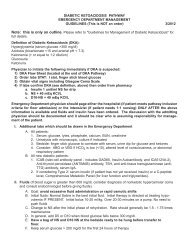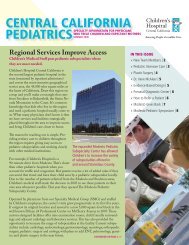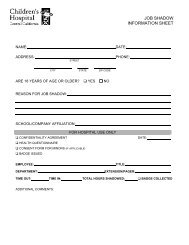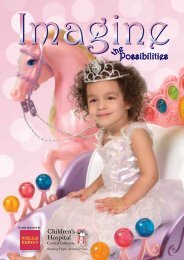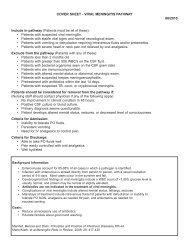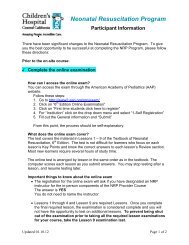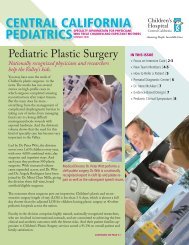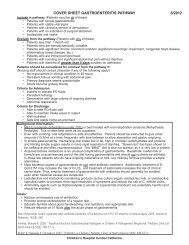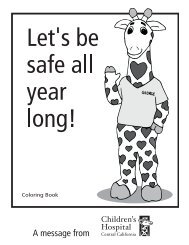Pertussis Pathway - Children's Hospital Central California
Pertussis Pathway - Children's Hospital Central California
Pertussis Pathway - Children's Hospital Central California
- No tags were found...
Create successful ePaper yourself
Turn your PDF publications into a flip-book with our unique Google optimized e-Paper software.
<strong>Pertussis</strong>Education Information for Patients and FamiliesWhat is pertussis?<strong>Pertussis</strong> (whooping cough) is an infection in the airways of the lungs that causes the breathingtubes (airways) to swell and narrow, leading to irritation and cough.How did my child get pertussis?It is caused by a bacteria called Bordetella pertussis. <strong>Pertussis</strong> is easily spread from one person toanother person. The infection may seem like a bad cold. People get it by breathing in air dropletsreleased from the nose or throat of a person who has the infection when he coughs, sneezes ortalks. It is also spread by contact with drainage from the nose or throat of a person who has theinfection.How will I know if my child has pertussis?The first signs are like that of a cold (runny nose, cough, sneezing, mild fever). Usually, over the2 weeks after you notice some first signs, the cough becomes worse. The cough comes in spasmsand can be followed by a high-pitched ‘whoop’ sound when taking in a breath. The whoop isfrom breathing through the narrow airways. Often children under 2 years of age do not whoop.The coughing spells are worse at night and can last for 1 to 2 months. The coughing can makeyour child• Vomit• Turn blue (face, lips or nails)• Have difficulty eating or drinkingWho gets pertussis?Anyone can get pertussis. Infants, children, or adults that have not been vaccinated or notvaccinated completely are at risk. Infants under the age of one are most at risk. <strong>Pertussis</strong> is mostdangerous to infants less than 1 year old. Older children and adults can get it even if they havebeen vaccinated as a child because protection from the vaccine only lasts 5 to 10 years from themost recent shot.How can I prevent the spread of pertussis?• Finish immunizations.• WASH YOUR HANDS frequently throughout the day• If your child has pertussis, he/she can infect others up until 5 full days afterantibiotics have been completed.• It is best to keep your child away from others who are sick. (kissing can spreadrespiratory germs)• Keep your baby or child from coughing or sneezing on others• Do not share drinks or food.• Clean drinking and eating utensils well after useChildren’s <strong>Hospital</strong> <strong>Central</strong> <strong>California</strong> • 9300 Valley Children’s Place • Madera CA 93636 • (559) 353-3000Revised: 10/2008 Review by: 08/2011 Page 1 of 3


